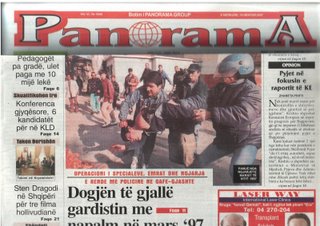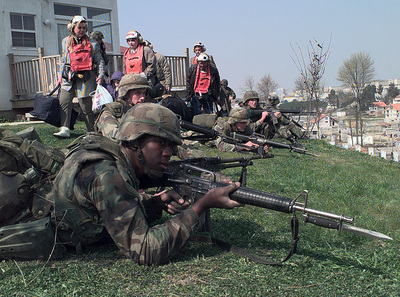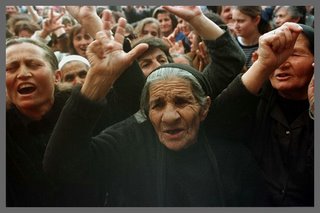 |
|
|
Albania at Risk of Reigniting the "Civil War of 1997" |
|
| Some months ago, Albanian Prime Minister Sali Berisha urged the investigative police division of the Interior Ministry to reopen cases on crimes committed in 1997 following the collapse of the notorious financial pyramid schemes. According to opposition figures, the initiative of Berisha is very dangerous because it could instigate a civil war in Albania, provoking a huge conflict between the northern and southern tribal sectors of the country. |
 |
Arrests have begun in Cerric, a little town near Schumbini River, 50km from Tirana, for charges of massacring “The Republican Guard” in 1997. |
|
The scope of the investigations has widened now, with officials examing cases in Saranda, a town in southern Albania. Arrests have begun there also, with charges of killing policemen in 1997. A large number of special forces police from Tirana collaborated in a joint operation with local law enforcment personnel from Saranda and Vlora to arrest about 25 persons for all the crimes reportedly committed in 1997, said the Albanian press. According to their sources, police may make arrests throughout southern Albanian territory, including Vlora, Argjirokaster, Berati, Fieri, and Koritca, among other areas. The Civil War of 1997 in Albania, known officially as the “Extraordinary Situation of 1997” could easily reignite if the sppecial forces continue these actions, according to some observers. According to the OSCE report based on estimates of “The ALBA Operation 1997,” the Multinational Protectorate Forces, installed in Albania by ONU Resolution of March 11, 1997, indicate that about 8000 were killed during “Civil War of Albania.” with about 1600 reported in the Vlora region. The catastrophic Albanian economy, the precarious internal political situation, and the uncertain status of Kossovo since December 2007 is bringing the country again under close watch by members of the NATO alliance. Geopolitical analysts for the Balkans often predict a dangerous “domino effect” from a proclamation of independence by Kossovo. Especially at risk are neighboring areas of the Former Yugoslav Republic of Macedonia, Bosnia and Albania. Ever since the coup d'etat of 1997-98, the stability of Albania has not been well controlled by government authority, even with the support of about 1200 NATO troops and hundreds of Europol agents conducting special operations against organized crime. |
|
 American citizens board a U.S. Marine Corps helicopter in a field inside the U.S. Embassy housing compound in Tirana, Albania, on March 15, 1997. DoD photo by Petty Officer 2nd Class Brett Siegel, U.S. Navy. |
 The 1997 Albanian rebellian against Berisha. [edd: Photo source unknown.] |
|
(Posting date 14 November 2007; revised 01-18-08) [Editors' note: This article has been heavily edited by HCS staff for stylistic and grammatical reasons, reinforcing our notion that the original compiler(s) were not native speakers of English. Although the sources of information for this piece are unknown, as are the names of the submitters, HCS decided to post the piece because of the author(s) apparent concern for the stability of Albania. Unrest in Albania affects a great many people of Greek descent in the U.S. and elsewhere, families whose roots trace back to Greek enclaves in southern Albania, known for many centuries as Voreio Epiros. Civil strife in Albania will likewise be of great concern to Greece, particularly provinces along the northern border.] For more information about the "Albanian Civil War of 1997," the original submitters suggested that readers read articles at the following links: http://www.cnn.com/WORLD/9703/11/albania.split/index.html http://www.globalsecurity.org/military/world/war/albania.htm http://www.cnn.com/WORLD/9701/27/albania/index.html http://www.cnn.com/WORLD/9703/06/albania.late/index.html http://www.cnn.com/WORLD/9703/03/albania/ http://www.cnn.com/WORLD/9703/04/albania.emergency/index.html http://www.cnn.com/WORLD/9703/13/albania.evac HCS encourages readers to view other articles and releases in our permanent, extensive archives at the URL http://www.helleniccomserve.com/contents.html. |
|
|
|
|
2000 © Hellenic Communication Service, L.L.C. All Rights Reserved.
http://www.HellenicComServe.com |
|
